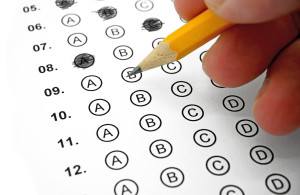Are You Smarter Than a 2L? (Internet Law Edition)

Photo credit: Filling out Answers on a Multiple Choice Test // ShutterStock
__
Q: Which 3 of the following 5 regulations reflect Internet exceptionalism?
a) Court interpretations holding that Uber must treat its drivers as employees instead of independent contractors
b) A city regulation imposing a “bed tax” on hotel stays, and defining airBnB rentals as hotels
c) A federal law (the “Internet Tax Freedom Act”) banning states from imposing sales tax collection obligations on e-commerce transactions
d) A state law excluding e-books from sales tax, even if the same material published in hard copy form would be subject to sales tax
e) A state law requiring online dating websites to check the criminal backgrounds of all paying members
__
Q: Which of the following types of information communicate some geographic information about the user?
a) mailing address
b) telephone number
c) IP address
d) credit card number
e) Social Security number
f) all of the above
__
Q: Joe Consumer books a cruise via the cruise line’s website. The cruise line is headquartered in a different state. In order to book the cruise, Joe must provide his residence address. During the cruise, Joe suffers a personal injury from a slip-and-fall. Joe wants to sue in his home court. If jurisdiction can be established at all, what is the most likely basis for Joe being able to establish jurisdiction over the cruise line?
a) General jurisdiction
b) Specific jurisdiction due to “minimum contacts”
c) Specific jurisdiction due to the “Effects Test”
d) In rem jurisdiction
e) A contract provision in the cruise line’s contract where the cruise line consents to being sued in Joe’s home court
__
Q: A web host has not filed the paperwork with the Copyright Office to designate an agent for notice, but the web host expeditiously honors all takedown requests. Under what circumstances can the web host successfully assert a 512(c) defense?
a) If it prominently disclosed the identity of the agent for notice on its website
b) If the web host is located outside the United States
c) If the web host deployed automated filters to prevent infringing items from being uploaded
d) It can’t assert the 512(c) defense
__
Q: In which of the following circumstances is a Section 230 defense likely to fail for the bolded party?
a) A Twitter user “retweets” another user’s defamatory tweet
b) An online classified ad service charges an advertiser to run the advertiser-submitted ad offering illegal prostitution
c) YouTube publishes a user-submitted video showing a person doing a stupid stunt that inspires copycats who injure themselves
d) An online magazine pays for and publishes a freelancer story that contains defamatory statements
e) PayPal processes the payment for an eBay transaction for fake sports memorabilia
f) None of the above
__
Q: Under what circumstances can a U.S. plaintiff compel Google to remove search results from its Google.com search index?
a) If the search result contains the plaintiff’s social security number
b) If the search result displays an unflattering photo of the plaintiff
c) If the search result contains factual assertions that a foreign court has declared defamatory
d) If the search result contains factual assertions that a U.S. court has declared defamatory
e) If the search result contains an outdated version of the plaintiff’s resume that the plaintiff posted to his personal website and subsequently replaced with an updated version
f) None of the above